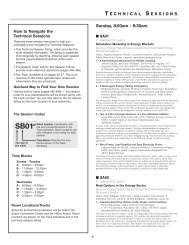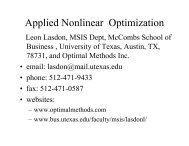Sunday
Sunday
Sunday
You also want an ePaper? Increase the reach of your titles
YUMPU automatically turns print PDFs into web optimized ePapers that Google loves.
SB42<br />
2 - Regulated Design & Pricing in the New Vehicle Market<br />
William Morrow, Assistant Professor, Iowa State University,<br />
2104 Black Engineering Building, Ames, IA, 50011-2161,<br />
United States of America, wrmorrow@iastate.edu, Josh Mineroff,<br />
Kate S. Whitefoot<br />
Regulations influence vehicle design and pricing. However, few models of policy<br />
impacts include strategic design decisions in response to regulation. This talk<br />
describes simulation of equilibrium design and pricing decisions under regulation.<br />
Examples are given for the new vehicle market and associated fuel economy<br />
standards. Our results demonstrate that simulations that neglect strategic<br />
behavior may overestimate the effectiveness of current policy approaches.<br />
3 - The Rebound Effect and its Implications on Obama’s Plan for a<br />
Clean Energy Future<br />
Eric O’Rear, Graduate Student, Purdue University, 403 W. State<br />
Steet, West Lafayette, IN, 47907, United States of America,<br />
eorear@purdue.edu, Wallace Tyner, Kemal Sarica<br />
Our paper will compare the impacts of Obama’s modifications to CAF…<br />
standards, with a more efficient carbon tax generating a similar level of CO2<br />
reductions. Further, we intend to capture the impacts of the “rebound effect”<br />
phenomenon associated with a mandate for a higher fuel economy on the U.S.<br />
energy system. We utilize the U.S. EPA MARKAL model - a bottom-up, linear<br />
programming (LP), partial equilibrium model – to replicate and compare the<br />
policies aligned with our interests.<br />
4 - Optimal Number of Certificates to be Issued in Emission<br />
Markets<br />
Cristian Pelizzari, University of Brescia, Contrada Santa Chiara, 50,<br />
Brescia, 25122, Italy, pelizcri@eco.unibs.it, Falbo Paolo<br />
The price of allowances in the EU ETS is linked to the value of the expected<br />
penalty for the CO2 produced in excess by diverse economic players. Too severe<br />
environmental policies cause a rise in the price of allowances. The compliance of<br />
such objectives can increase production costs causing inflation and loss of<br />
competitiveness. A stochastic programming model is advanced where the<br />
regulatory authority trades-off economic growth with environmental targets,<br />
influencing the choices of the players by means of the number of allowances to be<br />
issued.<br />
■ SB42<br />
42- North 227 C- CC<br />
Tactical Issues in Freight Transportation<br />
Contributed Session<br />
Chair: Mihalis Golias, University of Memphis, 104 Engineering Science<br />
Bldg, 3815 Centr, Memphis, 38152, United States of America,<br />
mgkolias@memphis.edu<br />
1 - Model Slection for Shipper’s Mode Coice<br />
Subhro Mitra, Assistant Professor, University of North Texas,<br />
University Hills Blvd., Dallas, TX, 75241, United States of America,<br />
subhro.mitra@unt.edu, Ali S. Shaqlaih<br />
This paper presents discrete choice models developed to determine the probability<br />
of mode choice between railroad and truck, based on revealed preference data.<br />
Utility functions are formulated using the attributes of the modes, shippers and<br />
interaction between the two. The choice probability is initially estimated<br />
assuming the random component to have a logit distribution. The model is<br />
further developed assuming the stochastic component to have heteroscedastic and<br />
probit distribution.<br />
2 - Efficient Heuristic for Auto-carrier Loading Problem<br />
Saravanan Venkatachalam, Research Associate, Texas A&M<br />
University, 304A Fermier Hall, 3367 TAMU, College Station, TX,<br />
77843, United States of America, saravanan@entc.tamu.edu,<br />
Arunchalam Narayanan, Bimal Nepal<br />
This belongs to a special group of logistics problem, as it needs solution for two<br />
NP-hard subproblems, namely routing and loading. There are several efficient<br />
methods for the routing part, but very few for the loading aspect. Existing<br />
methods in literature concentrate on the cost of loading and reloading and<br />
approximate the geometric, weight, and mechanical constraints of the vehicles.<br />
We demonstrate the application of a new heuristic which incorporates all these<br />
loading constraints.<br />
3 - Load Mixing with Freight Due Dates<br />
Sarah Root, Assistant Professor, University of Arkansas,<br />
4207 Bell Engineering Center, Fayetteville, AR, 72701,<br />
United States of America, seroot@uark.edu, Crystal Wilson<br />
The underutilization in trucking leads to nearly 5 billion gallons of wasted fuel<br />
annually. One way to recapture part of this waste is to use collaborative logistics.<br />
This research focuses on one specific aspect of collaborative logistics: load mixing.<br />
Load mixing is the idea of mixing two or more items of different weights in the<br />
INFORMS Phoenix – 2012<br />
94<br />
same container to reduce the number of trucks needed. In this research we<br />
explore the impact of product due dates on the mixing of commodities to more<br />
utilize trucks. We propose heuristics to solve this problem, and present<br />
computational results from this work.<br />
4 - Cost-stable Truck Scheduling at a Cross-dock Facility with<br />
Unknown Truck Arrivals<br />
Mihalis Golias, University of Memphis, 104 Engineering Science<br />
Bldg, 3815 Centr, Memphis, 38152, United States of America,<br />
mgkolias@memphis.edu, Dincer Konur<br />
We study a cross-dock operator’s truck scheduling problem at inbound doors in<br />
case of unknown truck arrival times. Due to uncertainty of truck arrivals, a<br />
scheduling strategy is defined as a schedule with low variation levels. A biobjective<br />
optimization problem is formulated and we discuss a genetic algorithm<br />
based heuristic to find Pareto efficient schedules. The proposed approach is<br />
compared to first-come-first-served policies.<br />
■ SB43<br />
43- North 228 A- CC<br />
RAS Problem Solving Competition<br />
Sponsor: Railway Applications<br />
Sponsored Session<br />
Chair: Kamalesh Somani, Manager Operations Research, CSX<br />
Transportation, 500 Water St, Jacksonville, FL, 32202,<br />
Kamalesh_Somani@csx.com<br />
1 - Movement Planner Algorithm Design for Dispatching on<br />
Multi-Track Territories<br />
Kamalesh Somani, Manager Operations Research, CSX<br />
Transportation, 500 Water St., Jacksonville, FL, 32202,<br />
Kamalesh_Somani@csx.com<br />
A dispatcher’s task is to give track authorities to trains to maximize overall system<br />
efficiency while abiding by a number of business rules. This is done by deciding<br />
which train takes the siding when two trains traveling in opposite directions meet<br />
each other, or when a faster train is to overtake the leading slower train. They<br />
must also decide on the departure and hold times at the yard where train<br />
originate terminate or stop for work events. The three finalists will compete at<br />
this session.<br />
■ SB44<br />
44- North 228 B- CC<br />
Topics in Supply Chain Management<br />
Contributed Session<br />
Chair: Tracy Johnson-Hall, Assistant Professor, Mason School of<br />
Business, College of William & Mary, P.O. Box 8795, Williamsburg, VA,<br />
23187-8795, United States of America, tdjohns@clemson.edu<br />
1 - Isomorphism Pressures and Management Support: An<br />
Empirical Investigation in Supply Chain Security<br />
Guanyi Lu, PhD Candidate, Mays Business School at Texas A&M<br />
University, 320N, 4217 TAMU, College Station, TX, 77843-4217,<br />
United States of America, glu@mays.tamu.edu,<br />
Xenophon Koufteros<br />
This study examines the antecedents and consequences of supply chain security<br />
practices. Data analyses based on 193 U.S. firms suggest that only normative and<br />
performance pressures have a sizable effect on top management support toward<br />
security (TMS). The results also show that TMS affects proactive and contingency<br />
planning which have strong positive effects on security performance.<br />
2 - Motivation of Time Compression Diseconomies on Transitory<br />
Network Collaborations<br />
Adrian Tan, PhD Candidate, Wilfrid Laurier University,<br />
75 University Avenue West, Waterloo, ON, N2L 3C5, Canada,<br />
tanx1410@mylaurier.ca, Hamid Noori<br />
Time-based competition is increasingly used across multiple industries as a basis<br />
for strategic advantage. However, the challenge of time compression diseconomies<br />
constraint companies from building internal resources for competitive purposes as<br />
rapidly as might be desirable. An empirical study to assess if companies can meet<br />
the challenge by engaging in transitory network collaborations is presented.



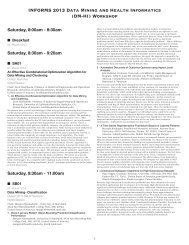
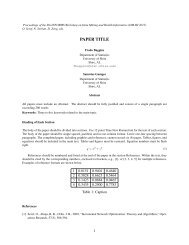
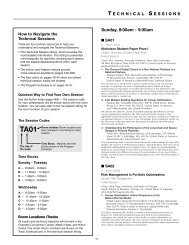
![[PDF] Charlotte Back Matter](https://img.yumpu.com/17933057/1/190x245/pdf-charlotte-back-matter.jpg?quality=85)
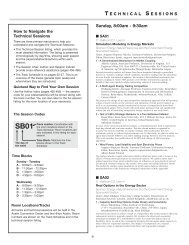
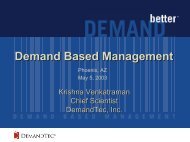
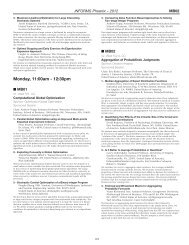
![[PDF] ALIO Back Matter](https://img.yumpu.com/17932960/1/190x245/pdf-alio-back-matter.jpg?quality=85)
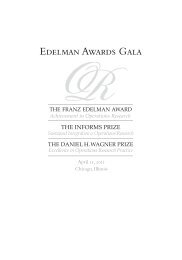
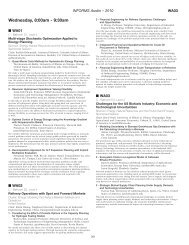
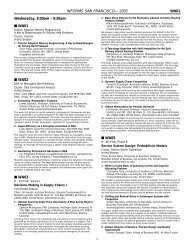
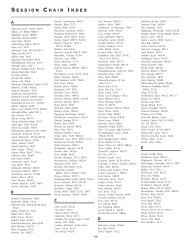
![[PDF] Monday, 8:00am - 9:30am](https://img.yumpu.com/17932954/1/190x245/pdf-monday-800am-930am.jpg?quality=85)
